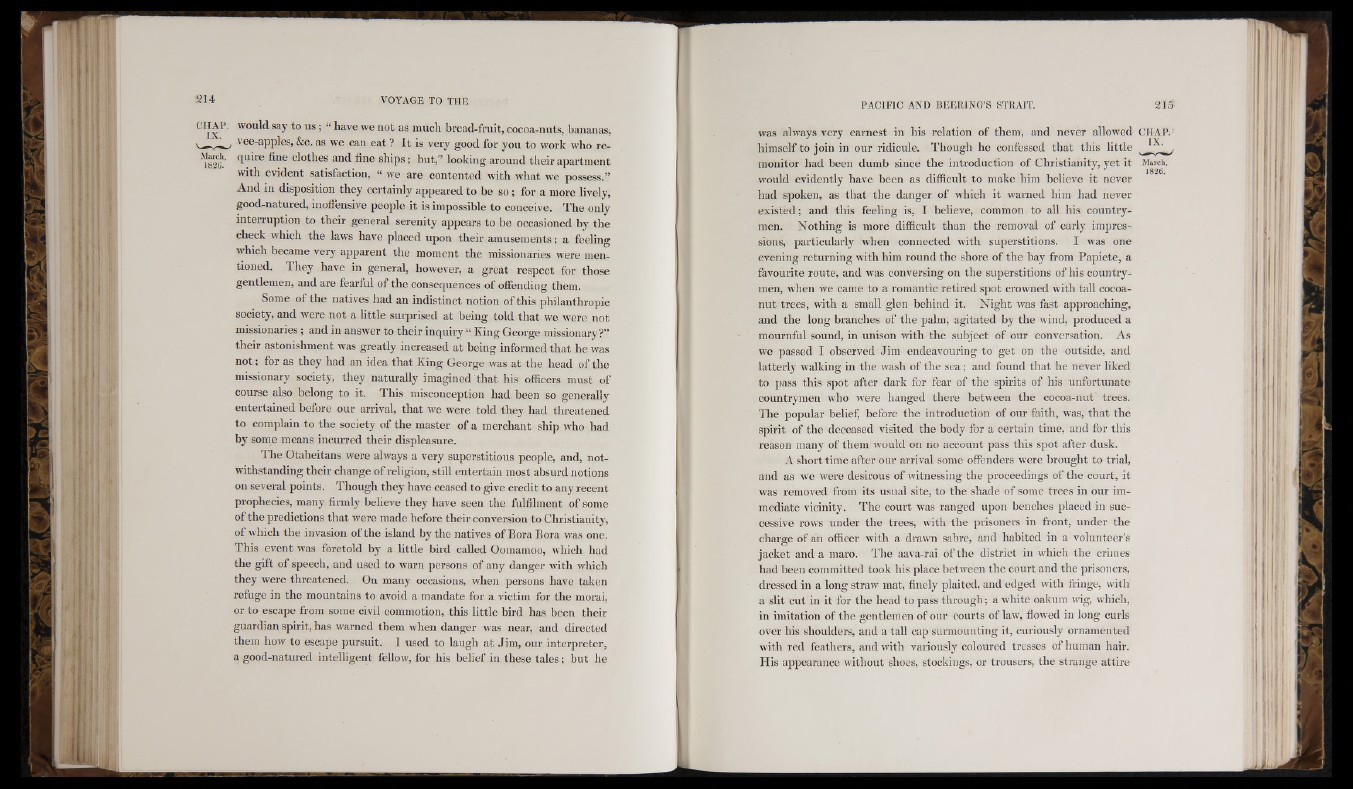
would say to u s ; “ have we not as much bi-cad-fruit, cocoa-nuts, bananas,
vee-apples, &c. as we can eat ? It is very good for you to work who require
fine clothes and fine ships ; but,” looking around their apartment
with evident satisfaction, “ we are contented with what we possess.”
And in disposition they certainly appeared to be so ; for a more lively,
good-natured, inoffensive people it is impossible to conceive. The only
interruption to their general serenity appears to be occasioned by the
check which the laws have placed upon their amusements; a feeling
which became very apparent the moment the missionaries were mentioned.
They have in general, however, a great respect for those
gentlemen, and are fearful of the consequences of offending them.
Some of the natives had an indistinct notion of tliis philantliropic
society, and were not a little surprised at being told that we were not
missionaries ; and in answer to their inquiry “ King George missionary?”
their astonishment was greatly increased at being informed that he was
n o t; for as they had an idea that King George was at the head of the
missionary society, they naturally imagined that his officers must of
course also belong to it. This misconception had been so generally
entertained before our arrival, that we were told they had threatened
to complain to the society of the master of a merchant ship who had
by some means incurred their displeasure.
The Otaheitans were always a very superstitious people, and, notwithstanding
their change of religion, still entertain most absurd notions
on several points. Though they have ceased to give credit to any recent
prophecies, many firmly believe they have seen the fulfilment of some
of the predictions that were made before their conversion to Christianity,
of which the invasion of the island by the natives of Bora Bora was one.
This event was foretold by a little bird called Oomamoo, which had
the gift of speech, and used to warn persons of any danger with which
they were threatened. On many occasions, when persons have taken
refuge in the mountains to avoid a mandate for a victim for the morai,
or to escape from some civil commotion, this little bird has been their
guardian spirit, has warned them when danger was near, and directed
them how to escape pursuit. I used to laugh at Jim, our interpreter,
a good-natured intelligent fellow, for his belief in these tales; but he
was always very earnest in his relation of them, and never allowed CHAP.
himself to join in our ridicule. Though he confessed that this little
monitor had been dumb since the introduction of Christianity, yet it
would evidently have been as difficult to make him believe it never
had spoken, as that the danger of which it warned him had never
existed ; and this feeling is, I believe, common to all his countrymen.
Nothing is more difficult than the removal of early impressions,
particularly when connected with superstitions. I was one
evening returning with him round the shore of the bay from J-’apiete, a
favourite route, and was conversing on the superstitions of his countrymen,
when we came to a romantic retired spot crowned with tall cocoa-
nut trees, with a small glen behind it. Night was fast approaching,
and the long branches of the palm, agitated by the wind, produced a
mournful sound, in unison with the subject of our conversation. As
we passed I observed Jim endeavouring to get on the outside, and
latterly walking in the wash of the sea ; and found tliat he never liked
to pass this spot after dark for fear of the spirits of his unfortunate
countrymen who were hanged there between the cocoa-nut trees.
The popular belief, before the introduction of our faith, was, that the
spirit of the deceased visited the body for a certain time, and for this
reason many of them would on no account pass this spot after dusk.
A short time after our arrival some offenders were brought to trial,
and as we were desirous of witnessing the proceedings of the court, it
was removed from its usual site, to the shade of some trees in our immediate
vicinity. The court was ranged upon benches placed in successive
rows under the trees, with the prisoners in front, under the
charge of an officer with a drawn sabre, and habited in a volunteer’s
jacket and a maro. The aava-rai of the district in which the crimes
had been committed took his place between the court and the prisoners,
dressed in a long straw mat, finely plaited, and edged with fringe, witli
a slit cut in it for the head to pass through ; a white oakum wig, which,
in imitation of the gentlemen of our courts of law, flowed in long curls
over his shoulders, and a tall cap surmounting it, curiously ornamented
with red feathers, and with variously coloured tresses of human hair.
His appearance without shoes, stockings, or trousers, the strange attire